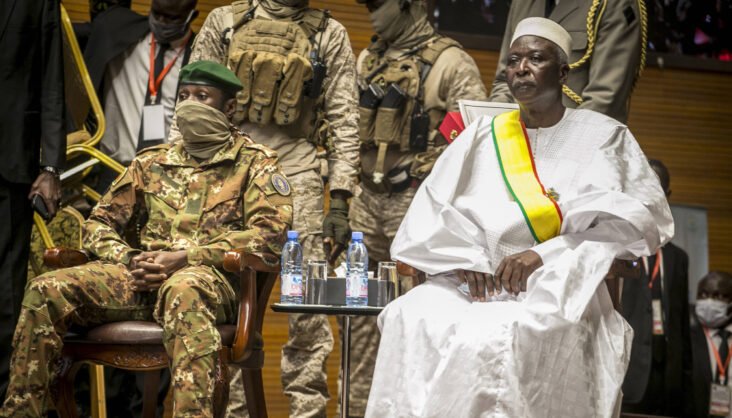“The National Committee for the Salvation of the People (CNSP) is dissolved,” said a Malian government decree on Tuesday. The decision comes five months after Malian President Ibrahim Boubacar Keita, known informally as IBK, was removed from office in a coup. CNSP was the body formed by the Malian military members who had organized the coup.
The military had seized power on August 18 after it led a coup that overthrew President Keita. Young army officers launched the coup after weeks of anti-Keita protests. The protests had been fueled in part by frustrations over governmental corruption and the president’s inability to end a conflict against Islamic and Tuareg insurgents that has raged since 2012.
Colonel Assimi Goita was the vice-president and retired Col. Bah Ndiaw the chairman of CNSP.
Following 2020’s coup, the military junta briefly governed the country through CNSP. The military, and the CNSP, remained in power, even after the reins were nominally handed to the interim civil-military government. This had continued to raise questions about the military’s persisting influence. The military junta leaders had initially said they would rule for three years before appointing the interim government.
The current interim government must hold elections within 14 months, according to the transition charter adopted on September 12. The charter stipulated that the coup’s military leaders would be granted immunity and “cannot be prosecuted or arrested.” Nonetheless, the Malian Constitution considers a coup a criminal act.
The Economic Community of West African States (ECOWAS), a political and economic union of 15 countries, had insisted on the dissolution of the CNSP as a condition for lifting a trade and financial embargo imposed on Mali by the West African leaders following last summer’s coup. On January 12, ECOWAS had again called on the interim Malian government to disband the CNSP.
Mali, one of the poorest countries in Africa, has been beset by an Islamic insurgency since 2012. SOFREP has been reporting on the insurgency for some time.
Mali has also been plagued by a number of coups.
The Malian Army was established in 1960 after the country gained independence from France. The country had no external foes and no history of internal repression. However, in 1968, Mali’s first president, Modibo Keita, was deposed after a poor cotton harvest hamstrung the country’s economy.
Young military officers, led by Moussa Traoré, took power. Yet, they failed to live up to the promises they had made to the people and transition to a civilian government. Instead, Traoré oversaw a police state for the next 22 years.
In 1991, he, too, would be deposed in a coup led by Lieutenant Colonel Amadou Toumani Touré. The National Reconciliation Council (later renamed to Transitional Committee for the Salvation of the People), chaired by Touré, was set up to temporarily run the country. In 1992, a civilian government was re-established following a constitutional referendum, presidential, and parliamentary elections.
Already have an account? Sign In
Two ways to continue to read this article.
Subscribe
$1.99
every 4 weeks
- Unlimited access to all articles
- Support independent journalism
- Ad-free reading experience
Subscribe Now
Recurring Monthly. Cancel Anytime.
In 2012, military officers, displeased and frustrated by the government’s handling of the Tuareg rebellion, formed the National Committee for the Restoration of Democracy and State. Eight years later, they managed to deposed Keita in the fourth coup in the country’s history.
Mali has had only one president who has not left office as the result of a coup.
Mali’s current interim government can set things right. However, with the Islamic insurgency raging and violence spreading it isn’t going to be smooth sailing.










COMMENTS